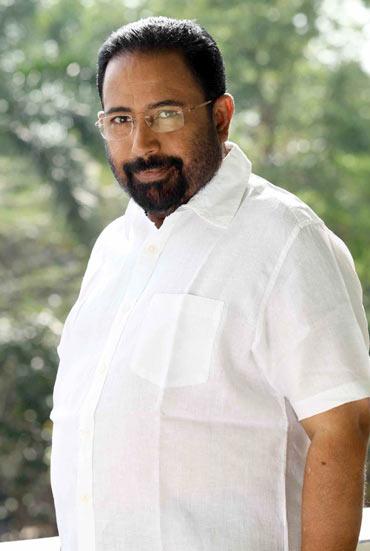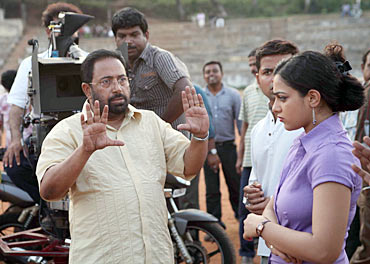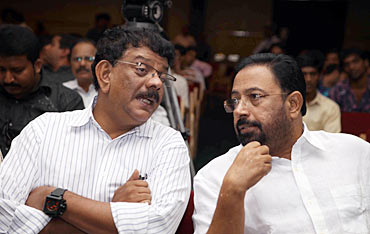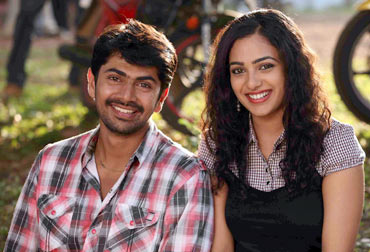 | « Back to article | Print this article |
25 years of Sibi Malayil
Sibi Malayil made his debut as a director in 1985, with the cult Malayalam comedy, Mutharamkunnu P O.
His association with the late Lohitadas started two years later and the rest, as they say, is history. A look at Siby's films is enough to know that the filmmaker is a genius.
Thaniyavarthanam, Kireedom, Bharatham, Dasaradham, Sadayam, His Highness Abdullah, August 1, Kanakkinavu and Chenkol among others include some of his well-known films.
Right now, he is making Apoorvaragam, a "love story, not quite in the conventional pattern", with some relative newcomers in the lead.
The soft spoken filmmaker spoke exclusively to rediff.com, about his films and career. Excerpts:
How does it feel to complete 25 in cinema?
[Smiles] I never imagined reaching this level. Even a career in films was not really in my scheme of things initially. Of course, films have always been a passion. Luckily for me, good things happened and I was accepted. Working with a great writer like Lohitadas was a turning point in my career. We made a great team and it has all worked in my favour. I am really happy that I could be part of quite a few films which have been much appreciated the viewers.
'I have never tried writing on my own'
You seem to have some kind of a comfort zone while choosing your topics. But still you have never been making the same kinds of films. How is it possible?
I have started my career as a director with a comedy, Mutharamkunnu P O. Later on, Thaniyavarthanam was the turning point in my career.
I think until Thaniyavarthanam, my types of films were not exactly defined. It reached the viewers in the sense that we anticipated their reaction and that is a blessing. We do our best to make a visual or create a situation. But it is when the audience accepts it the way we want them to, that it fulfills its purpose. It is not just because I take extra efforts; it is just that my feelings get connected to the viewers effectively.
Do you feel there is scarcity of such hard hitting stories now?
I am not basically a writer and in fact, I have never tried writing on my own. But yes, I do feel that there is a scarcity of writers. I am looking forward to writers who go along with my thought process. I have experimented with a few new writers. There have been some successes and failures. I think we need to have different kinds of films in Malayalam. Senior filmmakers like me have to think about them, and I believe that it's our responsibility to make different films.
'Some of my experiments have gone wrong'
Do you feel Malayalam films are no longer the same as the current generation of filmmakers are not connected to their roots, say like the earlier generation?
That's perhaps true and I sometimes feel that the kinds of films that the viewers are looking forward to are not happening these days. Lifestyles have changed and things have become too mechanical. People are hesitant to come out of the shells that they have created for themselves. They are all in a hurry.
Can you pick your best five films, during your stint as a director?
I would say Sadayam, Kireedom, Thaniyavarthanam, Dasaradham and Bharatham.
You have gone on record saying that you regret doing films like Ustad...
Yes, I have done certain films after Lohitadas decided to become a director, and some of the experiments have gone wrong.
'Apoovaragam is a love story about the approach of the young generation towards love'
What is your new film Apoovaragam about?
It is a love story about the approach of the young generation towards love. They take decisions forgetting from where they came and the situations that brought them up. But at a certain point of time, they realise that they were wrong in taking those decisions. That is the backdrop of Apoorvaragam.
Apoorvaragam seems to be quite unlike your usual genre?
It is the strength of the subject that attracted me. The script has been there with me for some time and it could only be done with new faces as the audience should not have any prior judgments about the nature of the characters.
Also it was never easy to find a producer for such a film. When I found the right actors in Nishan and Asif Ali, who were in Ritu, and Nithya Menon, I decided to make this film.



